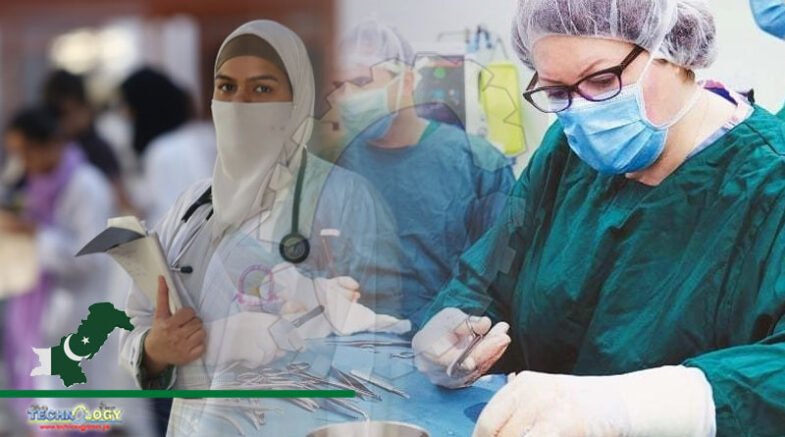Thirty years back the female-male ratio in medicine was 20:80, now it is 70:30 and 54 percent Pakistani Women are opting for post-grad education. Reports are very encouraging where Pakistan is concerned said Dr Khalid Masood Gondal

King Edward Medical College Alumni (KEMCA UK) Association of United Kingdom presented excellence award to Shirin Munir for being instrumental in changing the demographics in medicine in Pakistan.
“Thirty years back the female-male ratio in medicine was 20:80, now it is 70:30 and 54 percent females are opting for post-grad education. Reports are very encouraging where Pakistan is concerned,” said Dr Khalid Masood Gondal, KEMU Vice-Chancellor while talking at a webinar titled “Kemcolian Women in Medicine” organised by KEMCA UK in collaboration with KEMU Lahore and KEMCANNA. The women graduates of King Edward Medical University have a long history of serving in the healthcare sector throughout the world. The webinar held on Saturday was to celebrate their achievements and discuss some challenges.
Shirin Munir challenged limited number of seats for girls in medical colleges in the Lahore High Court in 1986 on which the court ordered colleges to admit students on open merit. Somebody challenged the decision in the Supreme Court after that where too she won. She was the petitioner and her father was her lawyer.
There was separate merit list for men and women. Women had a limited quota back then when Shirin completed her FSc pre-medical in 1986 from Lahore College for Women University. That year the Punjab government reduced the quota further on the pretext that women don’t practice. “I had worked hard but I was rejected for being a woman. I very much wanted to be a doctor. I never had a plan B. The Constitution says “there shall be no discrimination on the basis of gender alone”,” said Shirin Munir who went into veterinary sciences at that time and is now staff scientist respiratory viruses and vaccine development, National Institute of Health, Maryland. She said, “Equal right to education will not mean anything until their (women’s) families support them.”
Ayesha Shaukat, first female professor of surgery at KEMU said general surgery is a male-dominated field but she felt very welcome when she stepped in. “There are 232,358 registered doctors out of which 110,000 are females,” she informed at the webinar. She shared a slide in which doctors in Lahore were working in the operation theatre and they were all women, even the anesthetist was a woman. She observed that majority of women doctors are in obstetrics & gynaecology, pediatrics, dermatology and pathology. There are very few women in ophthalmology. In Ortho their number is zero. They need encouragement and support from family.
Many women doctors who have great contribution to different fields of medicine spoke at the webinar and all of them stressed on the need to extend support to women doctors. A system of adequate childcare has to be developed for women to work. They called for well-equipped daycare centres at workplaces, flexible hours during post-grad training and also in working environment. A doctor said it would be helpful to reduce very long hours. They said women have to go beyond their gender assignment. Women have to be just more assertive, have more self-esteemed. Support of parents, spouse and in-laws is imperative, they all agreed.
Punjab Health Minster Dr Yasmin Rashid said it was not possible to cater to health without a female doctor. Quite a number of young girls working in rural areas are preparing for post-grad, she informed and added that the government is working on childcare facilities in tehsil headquarter (THQs) and district headquarter (DHQs) hospitals.
She observed that women doctors were reluctant to handle medico-legal cases, primarily for security reasons but government is working towards that end. She said it was important that doctors had security and minimum political interference in their work. They are a huge asset to the country. Talking about the challenges she faced, she said she had her first child in her first year in medical education.
Afshan Hameed, Professor of Obstetrics and Gynaecology, University of California, has raised triplet girls who are now 16-year-old. Her expertise is cardiovascular disease and pregnancy. There is a lot of work that needs to be done for mother and child, she said. How she found work-life balance would baffle anyone. She and all the female doctors said they had very supportive spouses.
Aaisha Saqib, an expert in diabetes and endocrinology in London while talking on women as medical leaders, said every doctor needs to have some leadership training. She said it is important to encourage innovation.
Prof Bilqees Shabir, Head of the Department of Medicine said tele-medicine can be extended to the less privileged areas. “We are talking to a whole family when we are talking to a patient,” she said.
Source The News